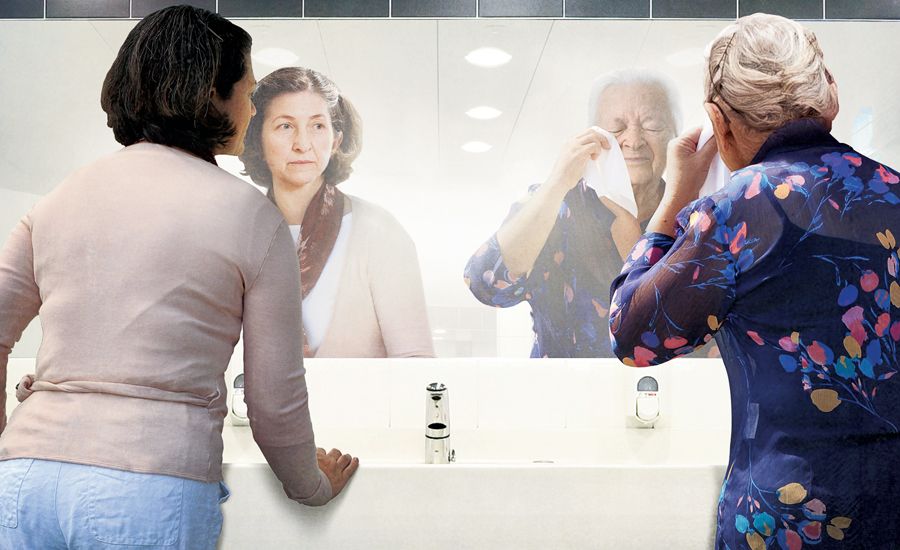“God, in the name of Mary, be with us, give us hope.” That’s what I had started praying before my grandson Patrick was even born.
When we were told the amniocentesis was abnormal. When his high-pitched, catlike cries drew the attention of the maternity ward staff. When at barely a day old, he stopped breathing. On every harrowing trip to the emergency room we’d made in the years that followed.
Every time I flashed back to that terrifying moment in the delivery room, when my daughter and I listened to the pediatric specialist’s grim prognosis: “He may not survive childhood.”
Then the day came. The day I believed God stopped listening, stopped caring. I stood outside the isolation room at Staten Island University Hospital, staring through the glass at my daughter, Tara, and Patrick, seven years old. If the results of Patrick’s MRI were what the neurologist suspected—an inoperable brain tumor—it was almost certain: Patrick would die.
I wasn’t just isolated from them, I felt isolated from God, from his goodness and his love. My grandson was a sweet, gentle child. Why, I screamed silently, why must he endure all this? I tried to pray for understanding, but the words stuck in my throat.
Remarkable evidence that angels walk among us
A nurse, chart in hand, touched my arm. “Sorry for the delay,” she said. “There’s another patient ahead of your grandson, so it’ll be a while.” Another minor cruelty, making Patrick wait, making us all wait, for confirmation of the worst. I signaled to Tara that I was going to the ladies’ room.
Patrick waved and blew kisses to me, his hazel eyes opening wide. “I love you, Boo Boo Bear!” I mouthed back. I barely made it to the bathroom before the tears spilled over.
Tara was a single mom, living with my husband and me, so I felt bonded to my grandson even before he arrived. I was standing right there when he entered this world, and I immediately sensed that the amnio was right. The doctor called it cri du chat syndrome, or cat cry syndrome, because of the distinctive sound of an affected child’s cry.
It occurs in one birth per 50,000, when a portion of the short arm of chromosome number five is missing. Most doctors go through their entire careers without seeing a case of it. Although Patrick was born without many of the problems that often go along with the syndrome, others he had: folds beneath his eyes, low-set ears, poor growth and muscle tone, and a hole in his heart.
Torticollis made it difficult for him to move his head and he was unable to suckle. At 24 hours old, his lungs gave out. Because he was already in the pediatric intensivecare unit, quick-acting nurses were able to revive him.
The pediatric specialist didn’t sugarcoat Patrick’s prognosis. His life would be a struggle, and likely shortened.
I had drawn upon a tradition of my Irish family when I appointed Patrick a spiritual guardian. He needed someone loving and strong. Who better, I’d decided, than Mary, the Mother of Jesus? “Mary is a mother,” I implored God. “She knows a mother’s love. Give Tara and me Mary’s strength to return Patrick if you call, and please don’t let our little one suffer.”
Over the years, Patrick had many health scares. Worry and panic often overrode my faith. It got to the point that even a simple case of toddler sniffles had me begging God: In the name of the Blessed Mother, please not today.
I hoped the bathroom would be empty. A sanctuary. But a gray-haired woman with beautiful skin the color of creamed coffee stood by the sink, blotting her tears with a paper towel. Our eyes met in the mirror. “Are you okay?” I asked, trying to swallow my own tears. No need for two of us to be blubbering.
She turned, looked at me for what felt like a long moment. Then she said, “Depends on what you consider okay. These are tears of gratitude.”
“Happy tears?” I asked.
“You could say that. We were on our way home to Florida from a wedding in Boston when our daughter got terrible pains in her legs. This was the nearest hospital. The MRI confirmed it was only a pinched nerve this time, so we’re going home today. She’s out in the car now with her father.”
I passed her another paper towel. “That is great news!” I said. “She’s had health problems before?”
“Many,” the woman said. “She’s an adult, but she has the mental age of a five-year-old. She’s nonverbal, which makes it hard to express how she’s feeling. I understand her signing but most people don’t.”
“She has a hearing impairment?”
The woman dropped her paper towels into the trash can. “No. She has a condition called cri du chat syndrome.”
I stared at her, my heart pounding and the room spinning. “She has cri du chat?”
“You’ve heard of it?”
“Yes,” I said. “My grandson has it. We were told that he would have severe health problems and a shorter life expectancy.”
“We were told the same,” the woman said. “Years ago, when they knew nothing about it. Doctors say a lot of things, but they forget that God has his own timetable. My daughter? She’s fifty years old.”
“Fifty! She’s fifty?” My words came out in a burst of astonishment.
The woman smiled and nodded, then checked her watch. “I have to get going before my husband leaves without me, but I will pray for your grandson. What is his name?”
“Patrick,” I said. “Thank you. Running into you helped me more than you’ll ever know. What’s your daughter’s name? I’ll pray for her too.”
“Mary,” she replied. “Her name is Mary.”
The woman left the bathroom. I followed shortly after. I returned to Tara and my grandson just in time to hear the results of his MRI: no tumor. A false alarm.
“God, in the name of Mary, be with us, give us hope.” I still say those words every day, and I know someone is listening. Today Patrick is eight and getting stronger. Not just surviving, but thriving.







